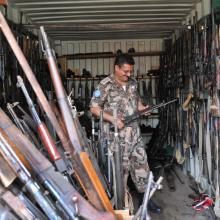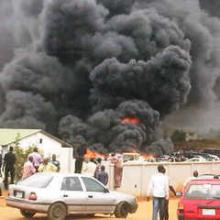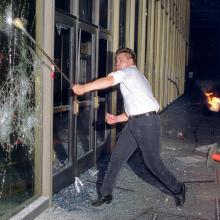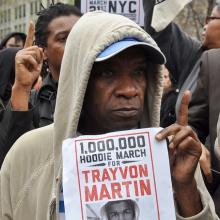Violence
There’s a famous maxim that says, “The only thing necessary for the triumph of evil is for good men to do nothing.” Though Wikipedia says otherwise, the statement is often attributed to Edmund Burke.
I doubt that Wikipedia will give me the credit for this 200 years from now, but I’d like to take a crack at a counterpoint to Burke’s famous maxim anyway: Sometimes evil triumphs not when good people do nothing, but when good people fail to distinguish between hypothetical evil and real evil, and end up doing something about the former when they should be doing something about the latter.
Case in point: National Conservative Christian radio host Kerby Anderson’s attempt to rally his followers to thwart the Senate from ratifying the Arms Trade Treaty.
Ongoing violence in Nigeria has exacerbated tensions between the country's Muslims and Christians. Nigeria has equal numbers of Christians and Muslims, and 92 percent of the country's population says they pray every day, according to a 2010 poll by the Pew Forum on Religion & Public Life.
Hundreds of Christians and Muslims have died this year alone, including scores killed last weekend (July 7-8) when Muslim militants attacked Christian villages in the nation’s central plateau, where the mostly Muslim north and the mostly Christian south meet.
Read five things you should know about the violence in Nigeria inside the blog...
Jesus was not just present for a year or two; he was present for 30 years before entering his formal ministry. There is an element of lingering inherent with submerging. It is a willingness to be present to the point of feeling like we are wasting time, when in reality we are leaving ourselves open to be used by the Spirit in ways we be might otherwise have never been aware of. Lingering is not simply walking aimlessly in circles; it is knowing what we are looking for and being intentional with our time and presence.
Jesus, with his building vocation as Messiah and inaugurator of the kingdom of God, spent time to linger, to be fully present and submerge into his context. And he did so for 30 years. Being the one chosen to redeem all of humanity, I have to wonder if he ever felt as thought he was wasting time at any point during the first 30 years of his life. After all, he had a lot of work to do and a renewed story to tell and invite God’s people into.
Archbishop Desmond Tutu writes for CNN on his hopes for peace in Sudan and South Sudan:
"My fellow Elders Martti Ahtisaari, Mary Robinson and I are going there to try to ensure that the terrible lessons of war are not forgotten - and to share our hope that these two beautiful countries can find a path to peace. We will relay the world's fears of another deadly conflict that would shatter the hopes of both nations and the broader region. And we will tell the leaders that, while it will take time and patience, we believe - as a result of our own experience - that peace can be achieved.
One of our main reasons for going to Sudan and South Sudan now is the humanitarian situation, which must be addressed as a matter of urgency. We are already witnessing an unbearable catastrophe with the fighting in Blue Nile and South Kordofan in Sudan, and the ensuing outpouring of refugees into South Sudan and Ethiopia."
Read the full article here
I have been actively listening to the words that are used in popular and social media. Our words are used to convey messages, shape cultures, and promote agendas. This is not a criticism, as we all participate in this process. We use words, images, and metaphors to try to shape a preferred precept or concept when we communicate. Our words are loaded with meaning, not just literally, but culturally and symbolically.
Every week, I talk to young men and women who are shaped and guided by the language used in the hip-hop culture. Interestingly, these are not young adults of one ethnicity or socioeconomic background, but young adults from across the spectrum of ethnicity, nationality, and economic status.
Editor's Note: This piece is part of a longer series on the wave of violence hitting Chicago, with murders for the year reaching the 250 mark this week. Some think the solution is purely over-policing or sending in the National Guard. Mayor Rahm Emanuel may legalize small amounts of marijuana so police can focus on violent crime. We asked some contributors—people who are on the ground in Chicago working for change—to discuss real, creative solutions.
For all its deep dish pizzas and –style hot dogs, The Crib is one of the most violent cities in the world.
When I say in the world, I mean that 1,976 Americans have died in Afghanistan since 2001, and there have been 5,056 murders in Chicago during the same period. (A specious stat for a number of reasons, but let’s move toward the point people are getting at when they mention this). This is a dangerous town. “How do we stop it?” is the million dollar question, and will net someone a Nobel Peace Prize if they can figure it out.
"Very truly, I tell you, unless a grain of wheat falls into the earth and dies, it remains just a single grain; but if it dies, it bears much fruit."
~ John 12:24
When tragedies loom so large, it is difficult to keep a perspective on the small things, to view things on a human scale.
We are trained to see the harvest and ignore the seed. We look at end results for the quick post and tweet. The planting, the watering, the tending is too tedious. Show me the aisles of glowing produce under the florescent lights and keep the dirt and the sweat away. Show me the abundance and not the labor.
And yet, every fruit and vegetable and grain begins as a seed. It begins in the smallest of things.
Soon, the story of Darius Simmons will become larger than life. A story that has picked up some media attention will no doubt soar – for a moment – as the Rev. Jesse Jackson and Rainbow PUSH continue to walk with his family and call for justice. This is their work and their calling and I bless them for it. I am thankful for it.
Darius’ story is a sensational one – full of racial tension and violence. It is a refrain sung over and over in our nation, the dissonant chorus that reminds us of our nation’s original sin.
DISNEY ANIMATION is often criticized for masking cynical corporate values—Wall-E’s profound challenge to over-consumption was accompanied by the selling of toys and games; the company claims to be pro-feminist but only tweaks the fairytale princess archetype with heroines who express their “strength” by showing that they can fight like a man.
Yet there’s still some magic in the Disneymagination—Fantasia, The Jungle Book, and The Lion King, despite their political alarm bells (racism and homophobia are challenged and reinforced, the average of which can only compute to ambivalence), are examples of visual resplendence, a sense of humor, and an invitation to hope. The best parts of the Disney worldview look like the eschatological images in a Martin Luther King Jr. speech; the worst merely bolster a culture of privilege and exclusion.
The most Disney-like current film is Mirror, Mirror, a retelling of the Snow White story, directed by the fantastic visual stylist Tarsem Singh. It features Julia Roberts in a wickedly entertaining turn as the queen, with a witty script, gorgeous set and costume design, and some bawdy fun. But the portrayal of Snow White as a “liberated” young woman whose liberation depends on her behaving like a Bruce Willis action character produces a paradox: Any of the images from this film could be exhibited in an art gallery—so elegantly composed and imaginative are they—but the ethical heart of the film isn’t artful at all.
From the Chicago Sun-Times:
Several thousand protesters spent five hours peacefully chanting, singing and marching against war. At the end, nearly 40 young veterans dramatically took their military medals and hurled them toward McCormick Place, where world leaders met behind closed doors.
It was supposed to end there — at Michigan and Cermak.
But a “Black Bloc” of about 100 anarchists wanted something else. The group, which chanted “What do we want? Dead cops!” as it left Grant Park at 2 p.m., surged to the front of the protest crowd and tried to break through the imposing line of Chicago cops in riot gear blocking its path.
Watch more videos from protests in Chicago inside the blog.
In this week's edition of The Economist, an examination of the continuing tensions between government forces and rebel groups:
"Last month [DRC President] Mr Kabila, who was widely criticised for stuffing ballots in last year’s re-election campaign, came out of self-imposed seclusion on his farm on the other side of the country, 1,200km (746 miles) to the west, to say he had had enough of the general’s antics. Or so it seemed. Three weeks later, Mr Ntaganda is now welcoming a steady stream of defections from the regular army, though numbers are hard to come by. More recently his men have clashed with regular forces and have grabbed some old hunting grounds."
From The Associated Press' Anne Gearan:
"Support for the war in Afghanistan has reached a new low, with only 27 percent of Americans saying they back the effort and about half of those who oppose the war saying the continued presence of American troops in Afghanistan is doing more harm than good, according to an AP-GfK poll.
In results released Wednesday, 66 percent opposed the war, with 40 percent saying they were "strongly" opposed. A year ago, 37 percent favored the war, and in the spring of 2010, support was at 46 percent. Eight percent strongly supported the war in the new poll."
Whenever there’s talk about honoring mothers and motherhood, I’m always looking for how we as individuals and a society will support the women—of any race, creed, or orientation--who have to scoop up their children and run for their lives or who feel forced to decide between enduring emotional and physical abuse and feeding their children.
The Violence Against Women Act (VAWA) has been one way that our country has acknowledged and worked to stop the abuse that occurs every day. As Lisa Sharon Harper wrote on this blog last week, the House of Representative’s version of VAWA would exclude certain groups from its protections.

A year ago today, I read a Tweet that President Barack Obama was interrupting primetime TV to address the nation regarding terrorism. My heart dropped. All I could think about was that terrifying feeling 10 years earlier while watching 9-11 coverage. It only took about half an hour of speculation on 24-hour news stations, Twitter, Facebook, etc., before reports came out that Obama would be announcing the death of public enemy No. 1, Osama bin Laden.
My first reaction was relief. The second, I confess, was one of pride—shared by the nation at the time and many still. But at some point in the aftermath, I read a friend’s post that convicted me and brought me back to reality.
News flash: The U.S. is using remotely piloted drones for targeted killing strikes against suspected terrorists. If you don’t think that’s news, you’re right. For years, it’s been the worst kept secret in Washington, but a speech yesterday by White House counterterrorism adviser John O. Brennan was the first official acknowledgement of the program. He insisted that it is consistent with U.S. and international law, even while admitting that civilians have been killed.
The news report noted,
"Brennan’s speech was also noteworthy, however, for what he withheld. He did not disclose how many people have been killed, list all the locations where armed drones are being flown or mention the administration’s increasing reliance on “signature” strikes, which allow the CIA to fire missiles even when it doesn’t know the identities of those who could be killed".
While this policy of targeted assassination should be ended immediately, the admission that it exists is an important step toward an important public debate.
Peter Bergen, a director of the New America Foundation, writes: “The president who won the Nobel Peace Prize less than nine months after his inauguration has turned out to be one of the most militarily aggressive American leaders in decades.”
And he adds up the evidence of the past four years:
"Mr. Obama decimated Al Qaeda’s leadership. He overthrew the Libyan dictator. He ramped up drone attacks in Pakistan, waged effective covert wars in Yemen and Somalia and authorized a threefold increase in the number of American troops in Afghanistan. He became the first president to authorize the assassination of a United States citizen, Anwar al-Awlaki, who was born in New Mexico and played an operational role in Al Qaeda, and was killed in an American drone strike in Yemen. And, of course, Mr. Obama ordered and oversaw the Navy SEAL raid that killed Osama bin Laden."
These actions, allegedly against the “threat of terrorism,” are reminiscent of the so-called Reagan Doctrine against the “threat of communism” in the early-to-mid 1980s. We’re still paying the price for the use of covert operations to attack insurgents, while supporting repressive and corrupt governments in that era. The Mujaheddin who were armed and trained to fight the Soviet occupation of Afghanistan are now the Taliban and Al Qaeda fighting the U.S. occupation. The price of the last four years is yet to be seen, but history suggests it will be substantial.
This weekend, if you can believe it, marks the 20th anniversary of the Los Angeles riots that followed the verdict in the Rodney King trial that acquitted four police officers of any wrong doing. Maybe some of us are old enough to remember the beating that King took as he was being arrested.
Maybe some of us are old enough to remember the violence that followed. Fifty people died in the riots.
Why do we bother to honor such memories? Why do we hold them up? St. John of the Cross, the Carmelite mystic, writes of a temporal veil that separates us from God. It's an unavoidable separation, he said, that every creature encounters.
We live in time. God does not. He also said, however, that by grace that veil can be torn, time and memory collapsing in upon one another and we are no longer separate from God.
It seems that drones have become the administration’s favorite form of warfare. There’s no danger to American troops, just unmanned aircraft killing from the skies. They’ve been used in Iraq, Afghanistan, Pakistan, Somalia, Libya, and Yemen.
The campaign in Yemen has so far relied on targeting specific individuals in an attempt to distinguish between al Qaeda leaders and Yemeni insurgents. But the CIA is now seeking to expand the campaign by asking for authority to launch strikes without knowing the identities of those being attacked. They call it “signature strikes,” choosing targets based on suspicious behavior. This, the CIA claims, involved putting together multiple intelligence reports to arrive at “signatures” of al-Qaeda activity based on vehicles, facilities, communications equipment and patterns of behavior.
Assassinating specific individuals (and often their wives, children and other people who happen to be with them) is bad enough. Attacks based on “signatures” of suspicious behavior is worse. Is a group of people gathering in a house an al Qaeda meeting, or a wedding? Is a truck convoy carrying weapons, or goods to market? It seems to me that if approved, it’s a policy change that will result in more civilian casualties and more questions about the use of drones.
Duane Shank is Senior Policy Advisor at Sojourners. You can follow him on Twitter @DShankDC.
Today is the anniversary of the Warsaw Ghetto uprising in 1943, and the day designated as Holocaust Remembrance Day. Ari Shavit, senior correspondent and editorial board member of Haaretz newspaper has some important reflections on how that remembrance is used and misused.
We are being torn between those who mention Auschwitz so that Israel will be deemed innocent in every situation, and those who distance themselves from Auschwitz so that Israel will always be guilty. As a nation, we have lost the ability to experience the Holocaust both as a universal event with humanitarian significance and as a unique event with Jewish and Israeli significance. …
It is our duty not to speak harshly and not to exploit it. The Holocaust was a terrifying event of insanity. The true imperative to be derived from the Holocaust is the imperative of sanity. Not to be enslaved to the past but also not to be alienated from it. To observe death, and to remember death - and to choose life.
In a world that seems dominated by death – from Afghanistan, Iraq and Syria; to South Sudan and the Congo; this day should allow us to reflect on the 6 million Jews who died in Europe and to redouble our efforts to work for life for the millions dying or threatened with death today.
Duane Shank is Senior Policy Advisor at Sojourners. You can follow him on Twitter @DShankDC.
Here I am meditating on the broken body that holds the divine and the human in the mysterious way that only the Omniscient understands.
Today, I reflect on this body of Christ. It beckons me and I’m reminded once again that the violence and death that happened on that dark day lingers still.
It lingers still because we all are created in the image of God.
Seldom does anyone accuses Geraldo Rivera of being a reporter. More often than not, he’s good for audacious soundbytes and a campy mug at the camera while sporting his trademark “look at me” mustache. He’s more circus performer than analyst, but in as much, he’s a sign (or symptom) of the state of “news” in today’s media.
Opinion journalism is one thing. I do it all the time. There’s a time and place for opinion. But there’s an important distinction between expressing genuine, informed opinions and lodging verbal salvos into the media fray sure to garner one some much-coveted attention in the next 24-hour news cycle.
Geraldo’s most recent stunt had to do with the case of Trayvon Martin. Most folks are familiar with the story in which neighborhood watch captain George Zimmerman shot teenager Trayvon Martin, who was unarmed, and that Zimmerman remains a free man because he claimed self-defense. I’ll forgo rehashing the details, as you can find them elsewhere, but there’s much discussion about what’s to blame for the boy’s death.










